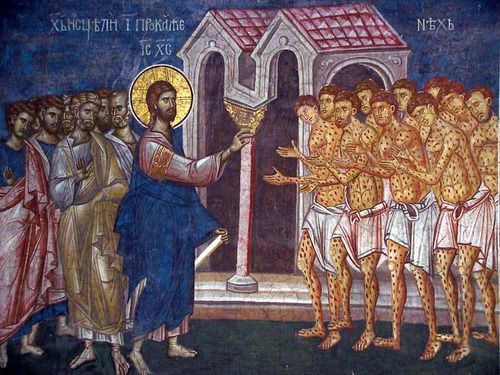#DailyDevotion LORD Have Mercy Upon Us
Psalm 123 I look up to You on Your throne in heaven. 2Yes, like servants looking to their masters’ hand, like a maid looking to her mistress’ hand, so we look to the LORD our God until He has mercy on us. 3Have mercy on us, O LORD, have mercy on us because we’ve had more than enough contempt. 4We’ve had our fill of being mocked by those who are at ease, our fill of being despised by the proud.
The LORD has given us this direction to look by His manifested actions in our sight of coming down and going up. So we see the LORD coming down on Mt. Sinai. The pillar of cloud and fire come down from heaven. We see the Angel of the LORD go up with the fire of the sacrifice. We see Jesus the LORD ascend to heaven forty days after the resurrection and we know He is coming down that way again. Jesus told us when we see certain signs look up because we know our redemption is near. The temple of the LORD was up for the pilgrims making their way up to it, who were singing this song, to celebrate the three mandated festivals for them. It is well for us to look up to the LORD to seek from Him all good things. We look up to Him and pray to Him to give us every good and perfect gift from above.
We do not only look up to receive. We also look up to Him for direction. The hand of the master or the mistress guides the actions of their servants. We are servants of the LORD. From the Temple, the LORD would have the priest instruct His people in His way from the Torah He had given them. We also gather together and look to the mouth of our pastors, whom He has given us, to instruct us in the ways the LORD Jesus has given us. We look to our LORD to give us mercy and to have mercy on us in His teaching.
In verse three, the theme of mercy comes up again. There are a total of three mercies then in the Psalm that are called upon. This is the Hebrew word “chanan.” Sometimes chesed (usually translated steadfast love) is used for mercy, but here it is chanan. In the Septuagint the two mercies in verse 3 are eleos, like kyrie eleos. In the Septuagint though in verse two the Greek word for mercy translated by the Jews is oiktirō. It is only used twice in one verse in the New Testament in Romans 9:15, where Pauls quotes Ex. 33:19, “I will be merciful to whom I want to be merciful; I will pity whom I want to pity.” It is the word “pity” that is translated from this word. Interestingly in Ex. 33 the Hebrew word being translated there in Exodus is racham. I guess it is all in the same semantic field. In our worship service we sing the three-fold Kyrie Eleson, Lord have mercy upon us. So in this Psalm there is a three-fold plea for the LORD to have mercy on us. We pray for mercy because we need the LORD’s word of instruction. We plead for mercy because we are held in contempt by all the world. Unfortunately, those who hold us in the most contempt for having the faith are those who claim to be in the faith but do not live by the faith.
Besides having our fill of contempt by others because of our faith in the LORD we are also filled with being mocked by them. Try expressing your faith on the internet or any public forum and you will soon join those who sing this Psalm on their way up to the Temple of the LORD. These people are at ease and full of pride. They are full of themselves and their supposed learning but they do not have understanding. It is understandable they have no understanding because they do not have the Holy Spirit. They do not submit themselves to God’s Word but to the philosophy of the world. But we need the LORD to have mercy and pity upon us so we can bear up under the cross laid upon us by our LORD Jesus Christ and to participate in His sufferings so we may participate in His glory when He returns.
O LORD, have mercy upon us, have mercy upon us, have mercy upon us, so we may know Your peace and live in Your understanding. Come quickly LORD Jesus Christ so we may enter into Your eternal kingdom and we may live under you. In You precious name we pray. Amen.


